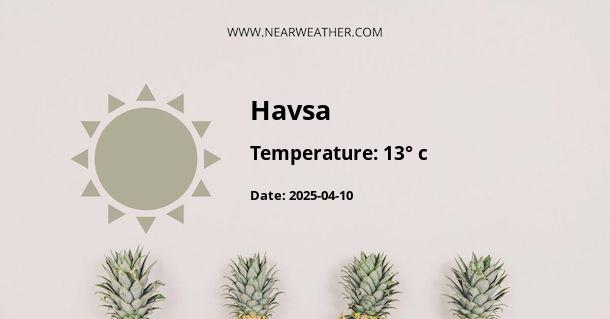Havsa, Turkey: Climate and Weather Year Round
Havsa is a beautiful town located in the Edirne Province of Turkey. As with any travel plans, it is important to understand the climate and weather patterns of the destination. In this article, we will explore the climate of Havsa throughout the year, including temperature ranges, precipitation levels, and the best time to visit.
Climate Classification
Havsa falls under the Köppen climate classification system as a Mediterranean climate (Csa). This means that it experiences hot, dry summers and mild, wet winters. The town is characterized by its long, hot summers and relatively mild winters.
Temperature Ranges
The temperature in Havsa varies significantly throughout the year. Summers are typically hot and can reach highs of around 30-35 degrees Celsius (86-95 degrees Fahrenheit). The warmest months are July and August, with average daily temperatures of around 32 degrees Celsius (90 degrees Fahrenheit).
During the winter months, temperatures in Havsa drop, but they rarely fall below freezing. December, January, and February are the coldest months, with average daily temperatures ranging from 5 to 10 degrees Celsius (41-50 degrees Fahrenheit). It is important to note that temperatures can occasionally drop below freezing during the night, so it is advisable to pack warm clothing for the winter months.
Precipitation Levels
Havsa receives the majority of its rainfall during the winter months. The wettest months are typically December and January, with an average of 100-150 mm (4-6 inches) of rainfall. Spring and autumn also experience some rainfall, but the amounts are generally lower compared to winter.
Summers in Havsa are generally dry, with very little rainfall. July and August are the driest months, with only a few millimeters of rainfall. This dry period, combined with the high temperatures, contributes to the arid conditions during the summer months.
Best Time to Visit
The best time to visit Havsa depends on personal preferences and desired activities. If you enjoy warm weather and outdoor activities, the summer months of June, July, and August are ideal. However, it is important to note that these months can be quite hot, so be prepared for high temperatures and potential heatwaves.
For those who prefer milder temperatures and fewer crowds, spring (April to May) and autumn (September to October) are excellent times to visit Havsa. The weather during these seasons is generally pleasant, with temperatures ranging from 15 to 25 degrees Celsius (59-77 degrees Fahrenheit).
Climate Chart
Below is a climate chart for Havsa, Turkey, showcasing the average monthly temperatures and rainfall throughout the year:
| Month | Temperature (°C) | Rainfall (mm) |
|---|---|---|
| January | 5-10 | 100-150 |
| February | 5-12 | 75-125 |
| March | 8-15 | 50-100 |
| April | 12-20 | 25-75 |
| May | 15-25 | 25-50 |
| June | 20-30 | 10-25 |
| July | 22-32 | 5-10 |
| August | 22-32 | 5-10 |
| September | 18-28 | 15-40 |
| October | 15-25 | 25-50 |
| November | 10-18 | 75-125 |
| December | 5-12 | 100-150 |
Conclusion
Havsa, Turkey, experiences a Mediterranean climate with hot, dry summers and mild, wet winters. The town's temperature ranges from around 30-35 degrees Celsius (86-95 degrees Fahrenheit) in the summer to 5-10 degrees Celsius (41-50 degrees Fahrenheit) in the winter. The wettest months are December and January, while the driest months are July and August. The best time to visit Havsa depends on personal preferences, with summer being ideal for warm weather and outdoor activities, and spring and autumn offering milder temperatures and fewer crowds. Use this information to plan your visit to Havsa accordingly and make the most of your trip!
A - Havsa's Latitude is 41.548981 & Longitude is 26.822069.
A - Weather in Havsa is 13° today.
A - Climate Conditions in Havsa shows few clouds today.
A - Humidity in Havsa is 46% today.
A - Wind speed in Havsa is 14.94 km/h, flowing at 263° wind direction. today.
